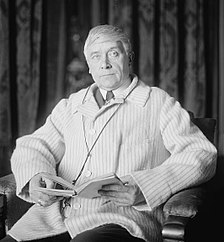Maurice Maeterlinck
Maurice Maeterlinck | |
|---|---|
 | |
| Born | Maurice Polydore Marie Bernard 29 August 1862 Ghent, Belgium |
| Died | 6 May 1949 (aged 86) Nice, France |
| Occupation | Playwright · Poet · Essayist |
| Language | French |
| Nationality | Belgian |
| Literary movement | Symbolism |
| Notable works | Intruder (1890) The Blind (1890) Interior (1895) The Blue Bird (1908) |
| Notable awards | Nobel Prize in Literature 1911 Triennial Prize for Dramatic Literature 1903 |
| Spouse | Renée Dahon |
| Partner | Georgette Leblanc |
Maurice Polydore Marie Bernard Maeterlinck,[1] also called Comte (Count) Maeterlinck from 1932,[2] (29 August 1862 – 6 May 1949) was a Belgian playwright, poet, and essayist. He wrote in French. He was awarded the Nobel Prize in Literature in 1911. The main themes in his work are death and the meaning of life. His plays are an important part of the Symbolist movement.
He finished his law studies at the University of Ghent in 1885. He then spent a few months in Paris, France. His first play, Princess Maleine, was well received in August 1890.
He had a relationship with the singer and actress Georgette Leblanc from 1895 till 1918. On 15 February 1919 Maeterlinck married Renée Dahon. She was actress he met during a rehearsal of The Blue Bird in 1910.
When Germany invaded Belgium in 1914, Maeterlink wished to join the French Foreign Legion. His application was denied due to his age.
In 1919 he accepted an invitation to the United States. He worked with Samuel Goldwyn on movies but did not find success.
He was made a count by Albert I, King of the Belgians in 1932.
He returned to Nice after the war on 10 August 1947. In 1948, the French Academy awarded him the Medal for the French Language. He died in Nice on 6 May 1949 after suffering a heart attack.
References[change | change source]
- ↑ Spelled Maurice (Mooris) Polidore Marie Bernhard Maeterlinck on the official Nobel Prize page Archived 2012-11-19 at the Wayback Machine
- ↑ Maeterlinck, Maurice in Encyclopædia Britannica
